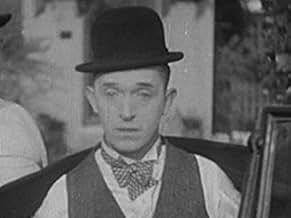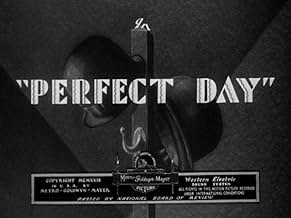ÉVALUATION IMDb
7,1/10
1,8 k
MA NOTE
Ajouter une intrigue dans votre langueThe boys and their wives are preparing for a drive to a Sunday picnic but infighting is ruining their plans and a sudden feud with a next-door neighbor completes the disaster.The boys and their wives are preparing for a drive to a Sunday picnic but infighting is ruining their plans and a sudden feud with a next-door neighbor completes the disaster.The boys and their wives are preparing for a drive to a Sunday picnic but infighting is ruining their plans and a sudden feud with a next-door neighbor completes the disaster.
Pete Gordon
- Neighbor
- (uncredited)
Charlie Hall
- Neighbor
- (uncredited)
Bobby Mallon
- Neighbor
- (uncredited)
Buddy Moore
- Neighbor
- (uncredited)
Charley Rogers
- The Parson
- (uncredited)
Grace Woods
- Friendly neighbor
- (uncredited)
Histoire
Le saviez-vous
- AnecdotesThe picnic was supposed to occupy the second reel, but the gags in the preparation and departure got so involved that they filled the entire two reels.
- GaffesThough Stan and Ollie never do manage to fix the flat tire, it's in good condition by the end of the film.
- Citations
Uncle Edgar: Oh, shit!
- Autres versionsWhen released in a computer colorized version, the scene following Uncle Edgar getting the tireless wheel along with the car crashed down on his gouted foot was cut out. It featured Stan holding the flat tire and notices a nail. He yanks it out and Ollie takes the tire from him before Stan can get the spare so it shows why they put the flat tire back on the car.
- ConnexionsFeatured in The Crazy World of Laurel and Hardy (1966)
Commentaire en vedette
Call me crazy ("Hey, crazy!") but I never enjoyed silent era films. I tried, oh I tried, but each time an actor's mouth moved there was nothing but an awkward silence. Then after what seemed too lengthy of a wait, a placard flashed on the TV screen, reflecting what the actor had just said moments before. I found this to be very distracting, plus it slowed down the natural comedic timing. This lapse between action and dialog, for me, was like watching an entire movie subtitled, and I couldn't square the two up.
That being said, I didn't watch any of the short and feature length "TV reruns" unless they were "talkies." As a kid who was fortunate enough to have a tiny black and white TV set in my bedroom, every Saturday morning before my parents or the Sun were up, I was thoroughly mesmerized by the vaudevillian, overtly physical humor of Buster Keaton, Our Gang (The Little Rascals), The Three Stooges, and of course, Laurel & Hardy.
The first Our Gang (The Little Rascals) talkie was "Small Talk" released in 1929. Buster Keaton's first talkie was "Free and Easy," released in 1930. The Three Stooges (Larry, Moe and Curly) most recognized talkie was The Woman Haters (1934). "Unaccustomed As We Are," released worldwide in 1929, was Laurel and Hardy's film debut with sound. It was an immediate hit with audiences.
Unlike many of their silent film era contemporaries who couldn't make the transition from silent to sound film, Stan Laurel and Oliver Hardy effortlessly slipped into this new media. Both actors had the rare gift of "comedic timing," and the duo knew how to thoroughly exploit sight gags. Moreover, lovable Hardy routinely broke the "fourth wall" of film, and after each hilarious yet tragic gag, he would often look straight at the camera as if to say, "Can you believe what just happened to me?"
"Perfect Day" (1929) was Laurel and Hardy's fourth sound movie. Like the first three, it is a short. The plot is simple: With their families aboard, (including a painful gout patient Edgar Kennedy) Stan and Ollie prepare to take their broken down Model T Ford out for a relaxing Sunday picnic. The boys manage to encounter everything from a flat tire to a neighbor who throws a brick through their windshield.
It's all brilliantly performed by two of the most iconic comedic teams in history, and supported by a wonderful set of actors who would often appear in many future Laurel & Hardy shorts and feature length films.
No spoilers here as usual, but I will reveal that Perfect Day contained no music other than a short piece for the opening credits. The Hal Roach Studios reissued the film in 1937 with an added music score.
That being said, I didn't watch any of the short and feature length "TV reruns" unless they were "talkies." As a kid who was fortunate enough to have a tiny black and white TV set in my bedroom, every Saturday morning before my parents or the Sun were up, I was thoroughly mesmerized by the vaudevillian, overtly physical humor of Buster Keaton, Our Gang (The Little Rascals), The Three Stooges, and of course, Laurel & Hardy.
The first Our Gang (The Little Rascals) talkie was "Small Talk" released in 1929. Buster Keaton's first talkie was "Free and Easy," released in 1930. The Three Stooges (Larry, Moe and Curly) most recognized talkie was The Woman Haters (1934). "Unaccustomed As We Are," released worldwide in 1929, was Laurel and Hardy's film debut with sound. It was an immediate hit with audiences.
Unlike many of their silent film era contemporaries who couldn't make the transition from silent to sound film, Stan Laurel and Oliver Hardy effortlessly slipped into this new media. Both actors had the rare gift of "comedic timing," and the duo knew how to thoroughly exploit sight gags. Moreover, lovable Hardy routinely broke the "fourth wall" of film, and after each hilarious yet tragic gag, he would often look straight at the camera as if to say, "Can you believe what just happened to me?"
"Perfect Day" (1929) was Laurel and Hardy's fourth sound movie. Like the first three, it is a short. The plot is simple: With their families aboard, (including a painful gout patient Edgar Kennedy) Stan and Ollie prepare to take their broken down Model T Ford out for a relaxing Sunday picnic. The boys manage to encounter everything from a flat tire to a neighbor who throws a brick through their windshield.
It's all brilliantly performed by two of the most iconic comedic teams in history, and supported by a wonderful set of actors who would often appear in many future Laurel & Hardy shorts and feature length films.
No spoilers here as usual, but I will reveal that Perfect Day contained no music other than a short piece for the opening credits. The Hal Roach Studios reissued the film in 1937 with an added music score.
- Sunsphxsuns
- 3 janv. 2022
- Lien permanent
Meilleurs choix
Connectez-vous pour évaluer et surveiller les recommandations personnalisées
Détails
- Date de sortie
- Pays d’origine
- Site officiel
- Langue
- Aussi connu sous le nom de
- Un día de campo
- Lieux de tournage
- société de production
- Consultez plus de crédits d'entreprise sur IMDbPro
- Durée19 minutes
- Couleur
Contribuer à cette page
Suggérer une modification ou ajouter du contenu manquant

Lacune principale
By what name was Perfect Day (1929) officially released in Canada in French?
Répondre






























